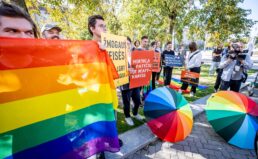More than 100 LGBT advocacy groups in Colombia have endorsed the peace deal between the country’s government and a rebel group that would end a decades-long war.
Colombia Diversa, Caribe Afirmativo and other organizations launched a campaign on Tuesday that urges Colombians to vote for the agreement in a referendum that is set to take place on Oct. 2. The groups made their announcement a day before the Colombian government and the Revolutionary Armed Forces of Colombia formalized the deal in Havana.
“Recognition of and respect for the rights of women, indigenous people, people of African descent, LGBTI and other population groups is necessary for the country to live in peace and to be able to fully develop its citizenry,” says Caribe Afirmativo on its website.
More than 200,000 people have died in the war that began in 1962.
Members of the FARC, paramilitaries and the Colombian army frequently targeted, displaced or even killed LGBT people during the conflict. Angélica Lozano, who is the first openly LGBT person elected to the Colombian Congress, once advised Íngrid Betancourt, who was kidnapped by FARC rebels in 2002 during her presidential campaign.
The 297-page peace deal specifically acknowledges the war’s LGBT victims.
It’s preamble notes the “fundamental rights” of LGBT Colombians, women, children, indigenous people, Colombians of African descent, farmers, people with disabilities, those displaced by the conflict and other “vulnerable social groups.”
The agreement calls for the creation of a “democratic culture and participation” in the country that would include LGBT Colombians and other vulnerable groups. It would also create a truth and reconciliation commission with representatives of the Colombian government and the FARC.
Representatives of Colombia Diversa and Caribe Afirmativo participated in the peace talks that began in Havana in 2012. Mauricio Albarracín of Colombia Diversa told the Washington Blade on Friday during a Skype interview from the Colombian capital of Bogotá that the deal is the first time LGBT people have ever been specifically included in a peace deal.
“It is very important that the agreement includes the rights of the LGBTI community,” he said.
Laura Weinstein, a trans rights advocate who lives in Bogotá, agreed.
“We have been victims of this armed conflict,” she told the Blade.
Wilson Castañeda, director of Caribe Afirmativo, described the peace process as one of “reconciliation” for Colombians.
“We know we can live in peace,” he told the Blade during a WhatsApp interview from the city of Barranquilla, referring to anti-LGBT discrimination and violence that remains commonplace in Colombia. “This is a very good opportunity for the LGBTI community in Colombia because there is a lot of hate against us.”
Religious groups pressure government over adoption
The Colombian Catholic Church is among the groups that also support the agreement that President Juan Manuel Santos spearheaded.
The Associated Press reported opponents of the deal have sharply criticized it because it would allow FARC members who admit their crimes during the conflict to not serve any prison time. Reports have also emerged that religious and conservative groups are pressuring the Colombian government to abandon efforts to extend adoption rights to gays and lesbians in exchange for their support of the deal.
“They are playing this game,” Albarracín told the Blade. “It’s absolutely awful.”
Colombia’s highest court in 2014 ruled gays and lesbians can legally adopt the biological children of their same-sex partner.
Ana Elisa Leiderman, a lesbian from the city of Medellín who was a plaintiff in the case, told the Blade this week that she welcomes the peace agreement between the Colombian government and the FARC. Leiderman added she remains concerned by “politicization” ahead of the Oct. 2 referendum.
Albarracín acknowledged that Colombians are divided on the referendum. He nevertheless reiterated his support of it.
“It’s a critical moment for the country,” said Albarracín.
Source: www.washingtonblade.com




